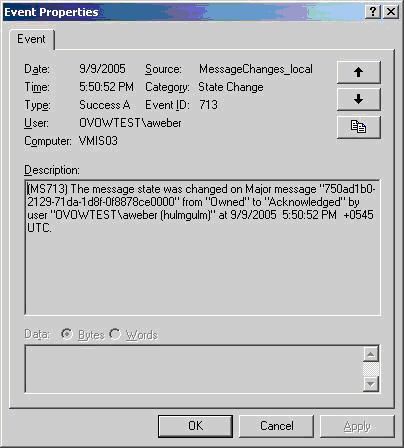
Message change audit event attributes
The Event Properties dialog displays message change audit attributes, as shown below:

The table explains the message change audit event attributes:
| Attribute | Description |
| Type | Is always "Success Audit." |
| Date, Time | Contains the date/time when the auditing event was logged. Due to race conditions, this may not be exactly the time when the message change was done in the local HPOM for Windows database; for forwarded message changes this may not be the time when the message change was originally made to the message on the sending server. |
| Source | Is "MessageChanges_local" or "MessageChanges_forwarded," depending on where the original message change was done. If changed locally, the source is "MessageChanges_local." If the message change was received from another management server, the source is "MessageChanges_forwarded." |
| Category | Can be one of the following, depending on the
message change that was audited:
The Category name is locale dependent and localized to Japanese, Korean, and Simplified Chinese. |
| Event | The identifier for the type of message change that
was audited:
|
| User | For local message changes, this is the local user who made the change. For forwarded message changes, this is the user account of the service that logged the auditing event; in most cases this will be the LOCAL SYSTEM account. |
| Computer | Always the host name of the local HPOM for Windows server. |
| Description | Depends on the type of message change that was
audited, as described below:
|
Localization Information
The Description string is locale dependent and localized to Japanese, Korean, and Simplified Chinese, as follows:$(DateTime) will be replaced by the date/time when the message change was done in the database on the local HPOM for Windows server. For forwarded message changes, this may not be the time when the message change was originally done to the message on the sending server.
$(DateTime) will be localized to the regional and language options of the HPOM for Windows server system (system settings, not the user settings, as done in the console).
For example, a system locale of English (United States) will
look like this: 8/30/2005 7:43:49 PM +0200 UTC. This
also indicates that the time is regionalized to central European
daylight savings time (UTC+2).
$(UserName) will be replaced by the user logon name, followed by the display name, as configured in the user configuration on the domain server, for example, "HPOMTest\Administrator (John Doe, HP USA)." The display name is only provided in $(UserName) if it can be resolved by asking the Domain server. To be able to resolve this name, the HPOM for Windows server must be a domain member of the user's domain. In the example above, the HPOM for Windows server must be member of the HPOMTEST domain to be able to resolve the user's display name.
The lookup of the display name is very expensive. For performance reasons this lookup is only done once and the lookup result is stored in a memory cache. A change of a user's display name on the domain server will not become visible in the HPOM for Windows message change auditing until the WMI service is restarted with the following command:
net stop winmgmt; net start winmgmt